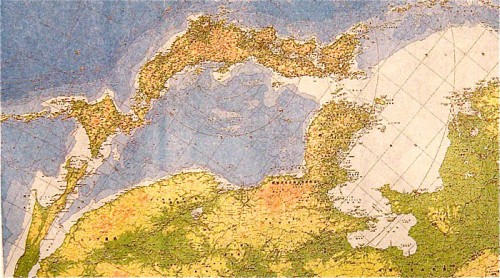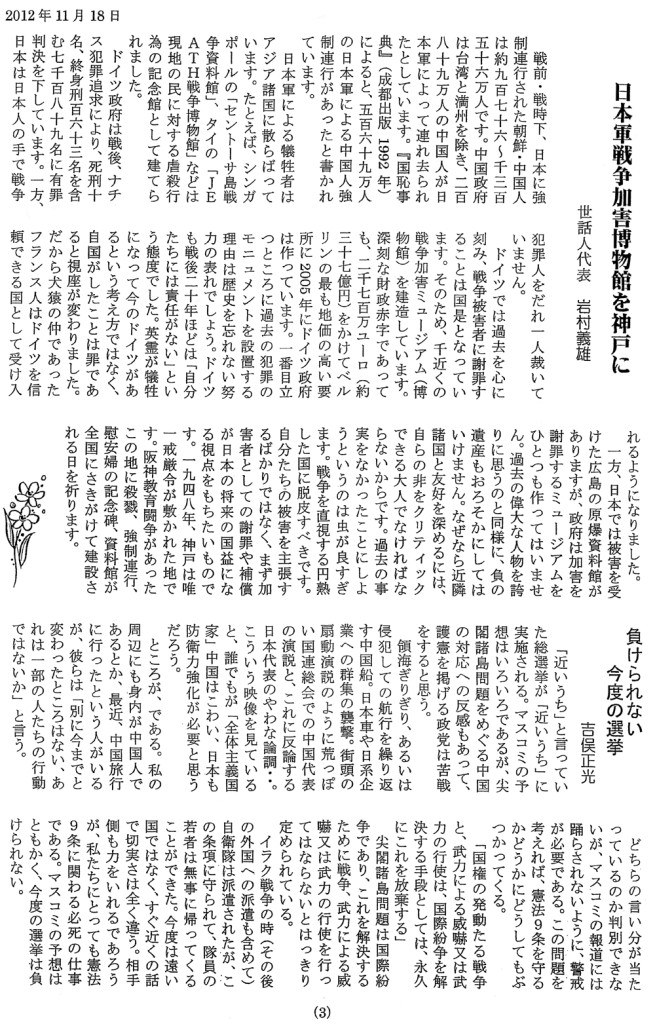消してはならない! 加害の歴史

過去に目を閉ざそうとする人間は,過酷な過去をもう一度経験するように強制される(元西ドイツ大統領ヴァイツゼッカー)
日本では被害を受けた広島の原爆資料館がある。一方,政府は戦争加害を謝罪するミュージアムをひとつも作ってはいない。過去の偉大な人物を誇りに思うのと同様に,負の遺産もおろそかにしてはいけない。隣国との友好にはドイツの千近くの加害博物館を見倣うべきだろう。
ドイツでは過去を心に刻み,戦争被害者に謝罪することは国是となっている。そのため,千近くの戦争加害ミュージアム(博物館)を建造。そのおかげで,犬猿の仲であったフランス人はドイツを信頼できる国として受け入れるようになっている。
戦争資料館設立 趣意書
「日本戦争加害博物館を神戸に」
英文 “Intention of Setup of the War Archive Museum in Kobe”
青地はクリックしてください。
2012年3月 設立準備委員会
発起人 岩村義雄
なぜ今,神戸に戦争加害博物館が必要なのか。2012年に,神戸に戦争加害博物館を作ろうと運動を始めた目的は何か。
戦争加害の事実を丹念に拾い上げたい。知性面の分析だけに終わってもならない。「リアル」に戦争を実証的に見つめ直す契機が必要である。なぜならば実際に日本軍がアジア周辺諸国に「侵略戦争」を行っていながら,戦後,政治家が「まぼろし」「偽り」「でっちあげ」と強弁しているからである。自国内はもとより国際的に「自存自衛」の戦争であったと日本政府は主張している。大虐殺,強制連行,慰安婦が存在しなかったかのように多くの日本人はいつしか無関心,忘却,風化の傾向を否めない。学校で学ぶ教科書からも削除され,戦争の歴史を真正面からとりあげていない。
戦争当時の現実を体験していないばかり,学んでいない21世紀の人々が,歴史文献を何冊読んでも実感できない問題がある。戦争に再び駆り出される社会に抗う心が育てられていない。戦場で雨あられの爆撃も経験していなければ,1937年12月1日から行なった日本軍による南京大虐殺を目撃証人でもない。朝鮮半島や中国,東南アジアなどで慰安婦を強制連行した現場をも知らない。
戦前,戦時下に日本軍が残虐な行為をしたと言うやいなや,自虐史観 masochistie view of history というオウムが反応するような空気が日本列島を覆っている。
しかし,731部隊が行なった人体実験,中国の撫順での住民虐殺,沖縄におけるジェノサイド[集団殺害]は決してねつ造したものではない。
忘れてはならない歴史を資料館が覚醒させるだけが目的ではない。日本軍兵士が行なった真実から繰り返してはならない歴史について学習することが本来であろう。
たとえば,シンガポールの「セントーサ島戦争資料館」,タイの「JEATH戦争博物館」などは日本軍が現地の民に対する虐殺行為の記念館として建てられた。
ドイツ政府は戦後,ナチス犯罪追求により,死刑10名,終身刑163名を含む7189名に有罪判決を下している。一方,日本は日本人の手で戦争犯罪人をだれ一人として裁いていない。
ドイツでは過去を心に刻み,戦争被害者に謝罪することは国是となっている。しかし,戦後すぐはドイツでも加害責任を認めたくない保守的な意見が覆っていた。1939年以降,ヒトラー扇動による戦争は第一の罪,一方,戦後,加害者としての罪に真剣に立ち向かわないことを第二の罪とドイツの民,政治家,メディアはとらえるようになった。その結果,1000近くの戦争加害ミュージアム(博物館)を建造。国が財政赤字にあがいていようがいまいが,博物館構想は頓挫しなかった。たとえば,2005年,ベルリンの最も立地条件のよい場所に,ドイツ政府は2700万ユーロ(約37億円)の建設費を承認した。
神戸は戦後3年を経た1948年に,唯一,戒厳令が敷かれた場所である。戦争当事国が攻略した国,地域の言語を奪うことは常套手段である。言語中枢の支配こそマインドコントロールの手法である。戦後になっても朝鮮語で学ぶ機会を与えないために朝鮮学校を排除しようと発砲した神戸事件[通称「阪神教育闘争」(1948年4月24日)]があった。母語による学校許可を願い出た朴柱範[パク・チュボム 1885-1949]は志半ばで倒れる。
過去の犯罪のモニュメントを設置する理由は歴史を繰り返さない証明である。ドイツも戦後20年近くは「自分たちには責任がない」がまかり通っていた。英霊の犠牲のおかげで国家が救われたという視点から,自国がしたことは罪であると素直に受け入れる否定の論理にシフトした。だから戦時下蹂躙された隣国フランス人は敵国ドイツを信頼できる国として認めることができたのである。
日本では広島の原爆資料館など「被害」を被った立派な施設がある。一方,「加害」について日本政府は語ろうとしないし,海外では反省の弁を臭わすが,謝罪もしない。それでは次代を担う若者たちはまったく無知な裸の王様であろう。過去の歴史で登場する英雄たちを誇りに思うのと同様に,負の遺産もおろそかにしてはなるまい。
未来志向で近隣諸国と友好を深めるため,自らの非を反省,謝罪,補償できる大人でなければならない。過去の事実をなかったことにしようというのでは虫が良すぎる。戦争を直視する円熟した国に脱皮すべきであろう。たとえ世界的に民主主義が後退しても,国が道を踏み外すことがあっても,平和を守ろうとする信念を捨象してはいけない。自分たちの被害を主張するのではなく,まず加害者としての謝罪や補償が日本の将来の国益になるという展望を日本人全体が共有することが前提である。そのためにも戦争資料館は戦争突入への抑止力,平和発信基地,教育に有益であろう。過去の資料を封印されてしまった日本人が戦争資料館によって,記憶の倉庫に保存しておくべき史実をよみがえらさせる契機となろう。Rememory をいつまでも噛みしめ,次世代が継承視点をもってほしい。いわば記憶運動である。
普遍的に民族,思想,宗教に関係なく,多くの人々が受け入れやすい共通認識は「平和」である。神戸に殺戮,強制連行,慰安婦の資料などが全国にさきがけて建設される日を祈る。
“Intention of Setup of the War Archive Museum in Kobe”
Date: October 30, 2016
_________________________
Yoshio IWAMURA
Promoting founder
A new museum to archive the memories of war inceptor – Why in Kobe? Why now? What is the reason to start
this project to set up a War Archive Museum from the perspective of those having started the war against other nations?
Our primary object is to find and archive the factual records on Japan as war
inceptor/perpetrator/victimizer in a meticulously detailed way, while it should not be simplistically a mere accumulation of intelligent analyses. It is essentially necessary to have a time to recollect the past wars based on “the naked reality” with supporting. Why? Because we know the post-war deception of certain Japanese politicians, who have tried to make people believe there were only something called ‘fantasy’ ‘fraudulent’ or ‘fake’, though the acts of the war-period Japanese Imperial Army were nothing but invasions toward other Asian countries and territories. Not only toward Japanese citizens, the post-war Japanese government has even been insisting that those wars were “to protect our own selves’ independence
” in the international scenes. I see there are trends of indifference, oblivion, or subside of our own countries’ modern history in majority of the current Japanese people, as if there were not “massive massacre” “forced deportation” or “consolation women” though I do not know when exactly these trends started. These words are neglected on the pages of school textbook sanctioned by the government, and the “nationally accredited textbooks of history” even do not mention directly and fairly the naked historical facts.The 21st century contemporary [Japanese or people], who are ignorant of the reality of the wartime, even have never been taught of the facts, may not be aware of certain core issues, although they have read thousand historical literatures. They are not encouraged to guard their heart so that they make a fight against a society which might drive them to get involved in wars against another nation. They are ignorant of the bombardments in a war field, where fatal bullets pour down right over their heads, or not eye- witnesses of Nanjing Massacre by Japanese Imperial Army, allegedly started from December 1st of 1937, while where the so-called forced deportations of “consolation women” from Korean Peninsula, China Mainland or other South East Asian countries and territories were carried out are beyond their knowledge.
‘Self-humiliating’ historical perspectives among Japanese nationals are so common that any opinions implying Japanese armies made atrocious acts [towards their Asian neighbors] before and during the latest war have been treated as a matter of facts at every corner of Japan.
However, the physical experiments made by Unit 731 led by General Ishii which carried out chemical and biological weapons towards Chinese civil people, massacre of residents in Fushun, Liaoning Province, China, and a genocide of Ryukyu people in Okinawa are not fabricated history at any means.
https://en.wikipedia.org/wiki/Unit_731
https://zh.wikipedia.org/wiki/731%E9%83%A8%E9%98%9F80
Our goals is not only limited to reminder of unforgettable historical facts through the archives of the Museum. It would have to be depicted as the principal role of the Museum that the reality of what Japanese soldiers had done in our history should be exposed and taught as they are so that the same errors should not be repeated.
For the similar goal, Fort Siloso Military Museum, Sentosa Island in Singapore, or The JEATH War Museum พิพิธภัณฑ์อักษะเชลยศึกหรือพิพิธภัณฑ์สงครามวัดใต้, Kanchanaburi in Thailand etc. were established in the memory of the atrocities that Japanese armies did toward the local residents or allied prisoners of war.https://discoversg.com/2016/02/15/5-war-museums-in-singapore/
https://en.wikipedia.org/wiki/JEATH_War_Museum
On the other hand, in the post-war Germany, the German government made judicial judgments to 7,189 persons as being guilty of crimes relating to Nazi’s organized crimes, including 10 persons with death penalty and 163 persons for life-long imprisonment. As for Japanese, no war criminals were punished by Japanese on own.
German nationals make it a national liability to keep good memory of the past war on mind and to apologize to the war victims. Though, in Germany immediately after the end of the last war, conservative opinions were predominant in the country, not willing to recognize their status of war victimizer, the situations had changed since 1939 that it has been the current mainstream among German citizens, politicians and mass media
that the primary crime is the war agitated and executed by Hitler, while the secondary crime is the intended attitude not to face the crime as war victimizer in the post-war period. Consequently, it turned out that over 1,000 war victimizer museums were built. No matter the German government was struggling with financial deficits, the plans to build the museums were not deterred. One exemplary is in 2005, the German government
granted approval to a museum construction cost Euro 27 million (around JPY 37 00 million) of a construction cost to build one in the possibly best venue in Berlin City. Now, Kobe was a only place in Japan where kaigenrei was validated in 1948, three years after the conclusion of the World War II. The war incepting country would often deprive the language of the war target country, that is, the attacked country, because it is a technique of mind-control. Even in the post-war period, we can cite Kobe Gun Shooting Incident, as known as Hanshin Education _STRUGGLE_: threatening by gun shooting so as to eliminate Korean Schools (or, Joseon Hakkyo) where education may be taught in Korean language (April 24, 1948). Pak Jubeom (1885-1949), a Korean who endeavored to apply for approval of mother tongue educational entity, was dead without seeing his wish was realized.
The reason why we wish to have a permanent exhibition of the memorabilia of the past war crimes is our resolution not to repeat the erroneous past incidents. German has had around two decades after the end of the war when they permitted themselves to claim their irresponsibility. A shift was made from the perspective that the state was preserved through the sacrifice of innumerable heroic souls to a self-denial collective awareness that accept the guiltiness of what their country had done as the facts of their own history. With that, the neighboring country, France, was trampled and occupied during the war time, came to acknowledge Germany, a former enemy, again as a trustworthy state.
In Japan, we have a number of well-designed exhibitions built in the perspective of a victim, such as Hiroshima Atomic Bomb Archive. Japanese government has never been willing to spoken officially o the Japanese role of war inceptor, while the Prime Minister or diplomatic ministers merely implied the regretful thoughts but not followed by apologies. This governmental officers’ actions overseas keep the young Japanese generation ignorant of our negative heritage and made them foolishly naïve of the country’s past bloodshed history, while heroic personalities are taught as a proud part of the history to be retold in the future generations. We and our progenies should not treat these negative heritages with indifference and oblivion.
If we wish to deepen the friendship with the neighboring countries and territories for the sake of our progenies’ future, we should be a mature minded national who can reflect, apologize and compensate our own wrongdoings. No other nation would never accept us an amicable neighbor if we simply neglect and pretend that there were no evil historical incidents on our side. We have to hold a viewpoint to face direct to the past wars, so that Japanese nation can be accepted as ‘grown-up’ country. We, individual nationals, ought
not to give up the credent to keep peace, even when our political entity might deviate from the right path.
I believe that it is a primary requirement for each of Japanese nationals to share in common a foresight in which the national benefit in the future would start with apologies and compensations as victimizer, instead of maintaining our status being victims. For this end, War Archive Museum will be a restraint power against bringing our country into wars again, a station remitting peace messages, and education. This war archive
museum will be a chance to reactivate the recollection of historical events to be archived into the memory bank for the sake of Japanese national, who has been severed with the past sealed and buried. We wish to have this museum to be our springboard for our next generation to step into the future, upholding the heritages from the past and retrieving the historical memory fresh all the time. This is a station where our memory is to be actively passed down.
Peace is a positive concept acceptable universally by many, regardless of ethnic, philosophical and religious background. We wish there will be a day when an archive of massacre, forced deportation, comfort women will have been built in Kobe, earliest among any other Japanese cities.
